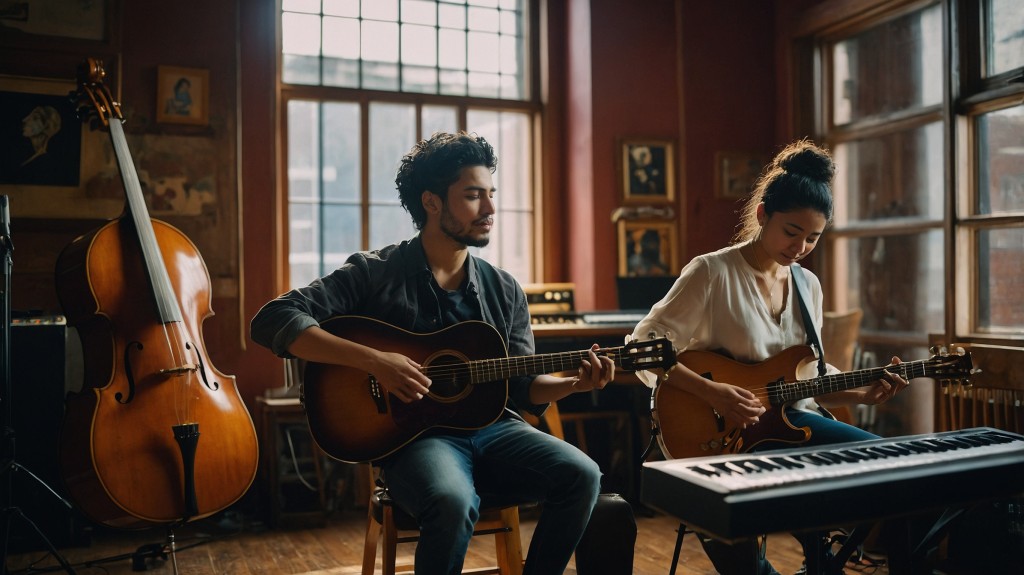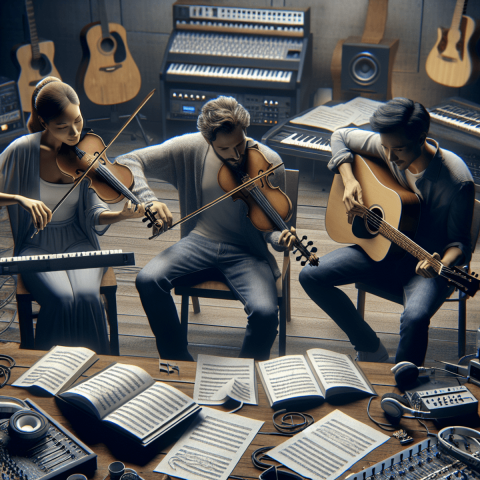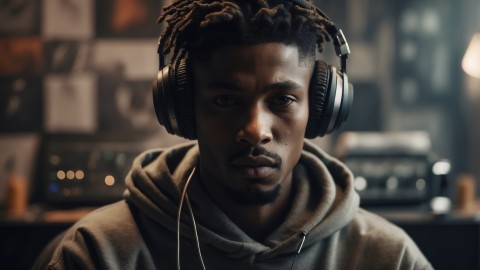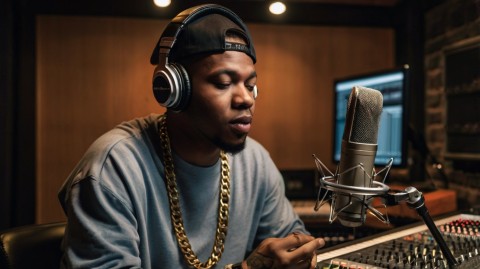Introduction
In 2024, the world of music promotion is being dramatically changed by new digital technology and shifts in consumer behavior. Technology has become a part of our everyday lives, completely transforming how music is made, shared, and enjoyed. This means that artists and marketers need to adapt and evolve in order to stay relevant.
It’s important to adapt to changes in music promotion. The old ways of doing things just don’t cut it anymore; using new tools and platforms has become a must. Artists need to take the initiative to understand and make use of these innovations in order to effectively connect with their audiences.
Key Trends Influencing the Industry
- Social Media: Platforms like TikTok and Instagram are central to audience engagement.
- AI: Transforming both music creation and marketing strategies.
- Genre Fluidity: Encourages experimentation across musical styles.
- Live Performances: Enhanced by AR/VR technologies for immersive experiences.
Understanding these trends is the first step towards mastering music promotion in 2024. By embracing these changes, artists can stay true to themselves while also forming genuine connections with their fans.
1. Embracing Social Media and Streaming Platforms
Role of Social Media in Music Promotion
Social media platforms are essential tools for music promotion in 2024. TikTok, Instagram, and YouTube offer unprecedented opportunities for artists to reach global audiences. The potential for content to go viral on these platforms can turn a single post into millions of views, making them crucial for gaining exposure.
Best Practices for Engaging Audiences
To make the most of your social media presence, consider these strategies:
- Regular Content Updates: Consistency is key. Regularly updating your profiles with fresh content keeps your audience engaged and coming back for more.
- Example: Weekly behind-the-scenes videos or snippets of upcoming tracks.
- Live Streaming Features: Use live streaming to interact with fans in real-time. Platforms like Instagram Live and YouTube Live provide direct engagement opportunities that build stronger connections.
- Tip: Host Q&A sessions or live mini-concerts to keep the interaction dynamic.
- Hashtags and Challenges: On TikTok, leveraging trending hashtags and participating in viral challenges can boost visibility.
- Pro Tip: Create a unique hashtag challenge related to your latest release to encourage user-generated content.
By integrating these practices into your social media strategy, you can significantly enhance your music promotion efforts in 2024.
2. Leveraging AI and Personalization in Music Marketing
AI is revolutionizing the music industry by transforming both creation and promotion. Generative AI, for instance, helps artists generate unique sounds and compositions, enabling innovative musical expressions. Tools like Amper Music and AIVA offer musicians new avenues for creativity, from chord progression analysis to complete track production.
In marketing, AI-driven strategies are becoming indispensable. Machine learning algorithms analyze listener behavior to craft personalized marketing campaigns. Platforms like Spotify utilize these insights to suggest songs, boosting an artist’s visibility. Customizable ad campaigns on social media also leverage AI to target specific demographics more effectively.
Personalization extends to streaming services where curated playlists have become a norm. Services like Spotify’s Discover Weekly and Apple Music’s For You playlists provide listeners with tailored recommendations based on their listening habits. These personalized experiences create stronger connections between artists and fans, enhancing engagement and loyalty.
Understanding these advancements allows you to harness AI tools for both creative and promotional efforts, ensuring your music reaches the right audience efficiently.
3. Exploring Genre Fluidity and Musical Experimentation
Genre fluidity is reshaping how artists approach music promotion. Blending genres opens up new avenues for reaching diverse audiences. For instance, fusion genres like electronic jazz or country-rap attract listeners from multiple fanbases, expanding your reach.
Impact on Music Promotion Strategies:
- Broadened Audience Base: Mixing genres can help you tap into various listener demographics.
- Increased Media Attention: Unique combinations often garner more media coverage, boosting visibility.
- Social Media Buzz: Genre-blending tracks are more likely to trend on platforms like TikTok and Instagram, where novelty thrives.
Encouraging Musical Experimentation:
- Creativity Boost: Stepping outside traditional genre boundaries can inspire fresh, innovative sounds.
- Collaborative Opportunities: Connecting with artists from different genres can lead to exciting collaborations that capture attention.
- Fan Engagement: Experimentation keeps your existing audience intrigued while attracting new listeners curious about your evolving style.
Embracing genre fluidity not only enhances your musical creativity but also broadens your promotional landscape.
4. Reviving Physical Formats in the Digital Age
The resurgence of physical music formats, particularly vinyl records and cassettes, presents a unique opportunity for artists to connect with fans on a tangible level. Despite the dominance of digital streaming, vinyl sales have been steadily climbing, with the global vinyl market valued at approximately $1.8 billion in 2023.
Vinyl Records
The tactile experience of owning a vinyl record, complete with album art and liner notes, offers fans a more personal connection to their favorite music.
Cassettes
These are also seeing a revival, appealing to nostalgic listeners and collectors alike.
Consumer Interest in Tangible Products:
Physical Collectibles
Fans often seek out physical collectibles as memorabilia, which can be leveraged to create special edition releases or bundled merchandise.
Marketing Strategies
Artists can utilize this trend by offering exclusive physical releases, hosting album signing events, or creating limited-edition runs that drive demand.
Understanding this shift towards tangible products allows artists to diversify their revenue streams and foster deeper connections with listeners through exclusive, collectible items.
5. Enhancing Live Performances with Technology
Live performances are crucial for artists, often making up a large part of their earnings. With technology advancing, the future of live shows is expected to be even more immersive and captivating.
Future Trends in Concert Experiences
1. AR/VR Technologies
Augmented Reality (AR) and Virtual Reality (VR) are changing the way concerts are experienced. These technologies enable fans to enjoy live performances in entirely new ways, whether it’s through VR headsets that transport them to virtual concert venues or AR applications that enhance physical spaces with digital elements.
2. Immersive Environments
Artists have the ability to craft one-of-a-kind, interactive settings using AR/VR, making their shows even more unforgettable. For instance, fans might explore a virtual universe created by the artist or engage with holograms during a live performance.
3. Enhanced Fan Engagement
These technologies not only improve the visual and auditory experience but also promote stronger connections between artists and fans. Interactive features like real-time responses and virtual meet-and-greets add extra layers of involvement.
By embracing these innovations, artists can elevate their live performances, creating unforgettable experiences that stand out in an increasingly competitive market.

6. Using Data Analytics for Targeted Promotion
Data analytics is essential in creating effective music promotion strategies. Services like Spotify and Apple Music offer artists valuable information about their listener demographics, which can be used to customize marketing efforts.
Here are some key ways to use data effectively:
- Identifying Popular Tracks: Find out which songs are being streamed the most and concentrate your promotional activities on similar styles or themes.
- Understanding Audience Geography: Plan your tour dates and marketing campaigns around the areas where your music is most liked.
- Engaging Specific Demographics: Utilize information such as age and gender to design focused social media advertisements and content.
By using data analytics to understand what your audience likes, you can create marketing strategies that are more personal and effective.
7. Building Lasting Connections Through Email and SMS Marketing Strategies
Email marketing and SMS marketing are still important tools for directly communicating with fans. These traditional methods help create customer loyalty by adding a personal touch that can sometimes be lost in the busy world of social media.
Here are some key strategies to consider:
- Segmentation: Tailor your messages by dividing your audience into distinct groups based on their preferences and behaviors.
- Personalization: Use fan data to craft personalized messages, addressing recipients by name and referencing their favorite tracks or upcoming events.
- Exclusive Content: Offer subscribers early access to new releases, exclusive merchandise, or behind-the-scenes content to make them feel valued.
- Regular Updates: Maintain a consistent communication schedule without overwhelming your audience. Share updates on tours, new projects, and other significant milestones.
By engaging with fans through these channels, you can create stronger connections and build a community around your music.
8. Collaborating, Networking, and Innovating Monetization Strategies
Collaborations and Networking are essential strategies for any artist looking to expand their reach in the music industry. Working with other musicians not only brings a fresh perspective to your work but also exposes you to their fans, effectively broadening your audience:
1. Collaborations
Joint projects can lead to innovative sounds and increased visibility. Examples include featuring on each other’s tracks, co-writing songs, or even forming supergroups.
2. Networking
Building relationships within the industry can open doors to new opportunities. Attend industry events, engage in online forums, and participate in community activities to grow your network.
Innovative monetization avenues are gaining traction as artists seek alternatives beyond traditional album sales:
- Digital Merchandise Sales: Platforms like Bandcamp allow artists to sell digital merchandise directly to fans. This includes exclusive tracks, special edition albums, and more.
- NFTs (Non-Fungible Tokens): NFTs offer a unique way to monetize music by selling digital collectibles that can include unreleased tracks, artwork, or concert tickets.
- Direct-to-Fan Marketing: Engage with your audience through platforms that facilitate direct sales and communication. This can create a more personal connection with your fans while boosting revenue.
Adapting these strategies can significantly enhance an artist’s growth trajectory, ensuring they remain competitive in an ever-evolving landscape.
9. Overcoming Challenges Facing the Music Industry
Addressing the challenges within the music industry is crucial for artists to thrive. Here are some of the key issues that need to be tackled:
1. Low Royalty Payouts
Low royalty payouts from streaming services remain a significant issue. Platforms like Spotify and Apple Music offer minimal compensation per stream, making it difficult for many artists to earn a sustainable income.
Solutions:
- Seek alternative revenue streams such as merchandise sales, live performances, and crowdfunding.
- Leverage direct-to-fan platforms like Bandcamp or Patreon to connect with supporters and generate income.
2. Combating Digital Piracy
Digital piracy continues to pose a threat to revenue. Despite advancements in technology, unauthorized distribution of music remains rampant.
Solutions:
- Implement effective anti-piracy measures such as digital rights management (DRM) tools and watermarking.
- Engage in awareness campaigns to educate fans about the value of purchasing music legally.
3. Advocacy for Artists
Advocating for artist rights and fair compensation is another pressing concern. Many artists face unjust contracts and unfair treatment from record labels and management companies.
Solutions:
- Join unions and advocacy groups that focus on protecting artist rights.
- Participate in organizations that champion artist rights and promote equitable compensation practices.
By addressing these issues head-on, artists can work towards creating a more equitable and sustainable industry environment.
Conclusion: Mastering Music Promotion In 2024
Embracing change while maintaining authenticity is crucial for mastering music promotion in 2024. Artists should focus on building lasting connections with their audiences, leveraging both traditional and innovative strategies. By staying adaptable and authentic, you can navigate the evolving landscape of the music industry effectively.
Remember: The key to success lies in your ability to connect with fans on a personal level while utilizing cutting-edge tools and trends.








